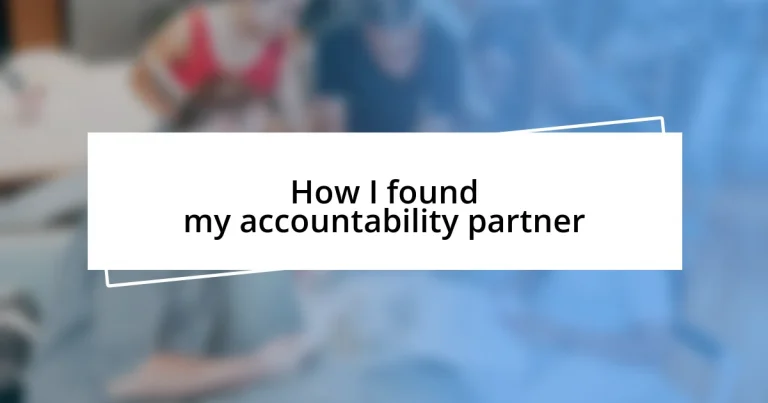Key takeaways:
- Finding the right accountability partner involves identifying your needs, ensuring compatibility, and establishing shared goals to enhance motivation and support.
- Open communication and vulnerability are essential in building trust and maintaining accountability; sharing struggles can deepen the partnership.
- Flexibility and creativity in scheduling check-ins and setting small achievable goals help overcome challenges and keep both partners engaged and motivated.
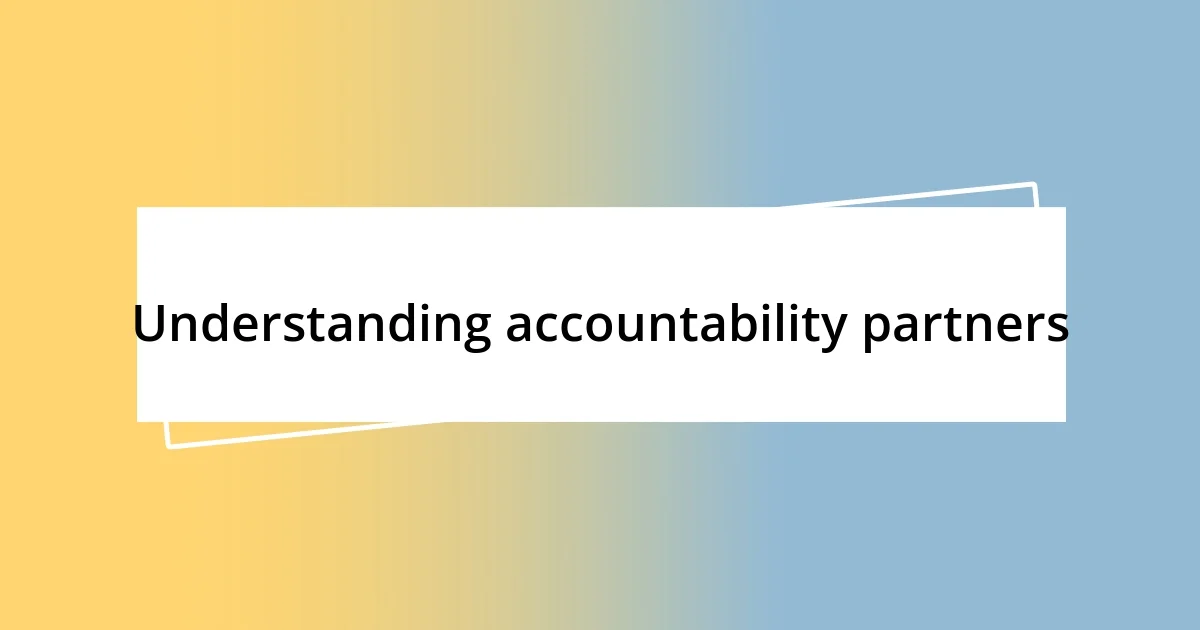
Understanding accountability partners
When I first encountered the concept of accountability partners, it felt like stumbling upon a hidden treasure. These individuals can significantly influence our progress, acting as both cheerleaders and critics. Have you ever wondered how a simple chat can keep you more focused on your goals?
An accountability partner isn’t just someone you check in with; they’re a collaborator in your journey. I remember when I teamed up with a friend to tackle our fitness goals. Every week, we not only shared our progress but also our struggles. That sense of shared commitment made us both push harder than we would have alone.
It’s fascinating how this dynamic works. When you know someone is counting on you, you naturally feel compelled to show up for them. Have you experienced the magic of keeping promises to others? There’s an undeniable emotional weight that reinforces your own resolve. It’s like having a mirror reflecting your intentions and aspirations, propelling you toward success together.
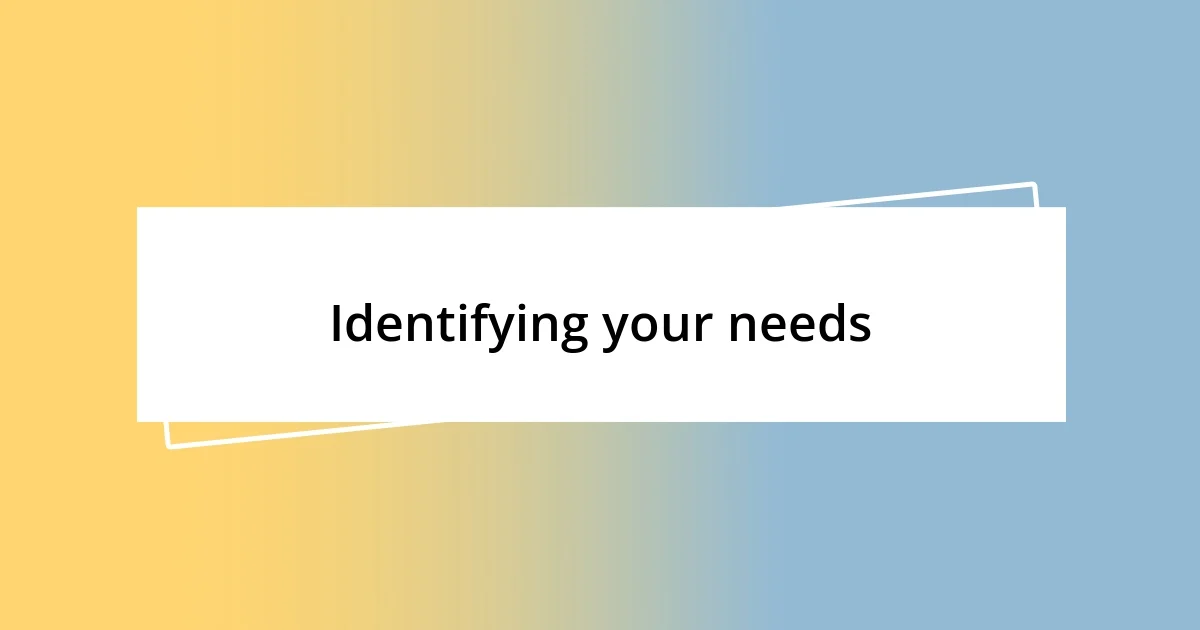
Identifying your needs
Identifying your needs is a crucial first step in finding the right accountability partner. Personally, I took the time to sit down and reflect on what I really required from this type of relationship. For me, it was important to find someone who understood my goals deeply. What about you? Are you looking for support in a specific area, like fitness or work projects, or do you need someone who can challenge your perspectives?
In my experience, not all accountability partners serve the same purpose. Some may excel at providing emotional support, while others might be more effective at pushing you to meet deadlines. I remember first teaming up with a colleague who focused on productivity. Each week, we held ourselves accountable for deadlines, and it drove me to push through tasks I had previously dreaded. It’s interesting how a clear understanding of your needs helps you choose the right partner to complement your journey.
Evaluating your objectives can also lead to uncovering deeper motivations. Reflecting on past experiences, I found that I not only needed accountability but also growth through constructive feedback. Thinking about this made me realize how essential clear communication is in a partnership. Which skills do you want to enhance through this relationship? This initial self-assessment shapes not only who you seek out but also the success of your collaborative efforts.
| Need | Description |
|---|---|
| Emotional Support | Someone who encourages and uplifts you during challenging times. |
| Accountability for Deadlines | A partner who helps you stay on track with your time-sensitive goals. |
| Constructive Feedback | Providing reliable insights to help you improve and grow. |
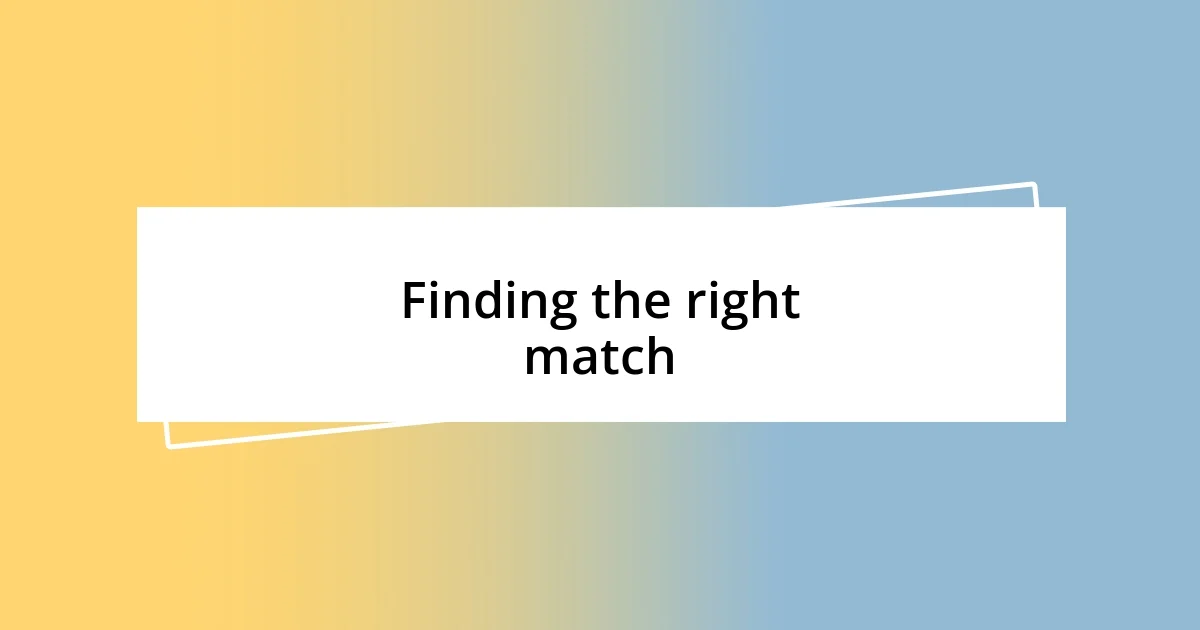
Finding the right match
Finding the right match requires a blend of compatibility and shared aspirations. I learned firsthand that having common ground boosts motivation. When I partnered with someone whose goals aligned with mine, I felt a sense of unity. We were both striving for similar achievements, which created an unspoken pact to push through challenges together. It’s vital to choose someone who resonates with your objectives and values, making the journey not just productive but also enjoyable.
Here are some key considerations during your search:
- Shared Goals: Look for someone with similar objectives to foster a collaborative spirit.
- Communication Style: Find someone who communicates in a way that feels natural and encouraging to you.
- Availability: Ensure your potential partner can consistently commit to regular check-ins or discussions; reliability matters.
- Mutual Respect: It’s essential that both partners value each other’s input and experiences, creating a safe space for growth.
- Personal Connection: Sometimes, a bit of chemistry can make a difference in how well you connect and support each other.
Reflecting on these aspects will help in finding a partner who is not just present but genuinely invested in your shared journey.
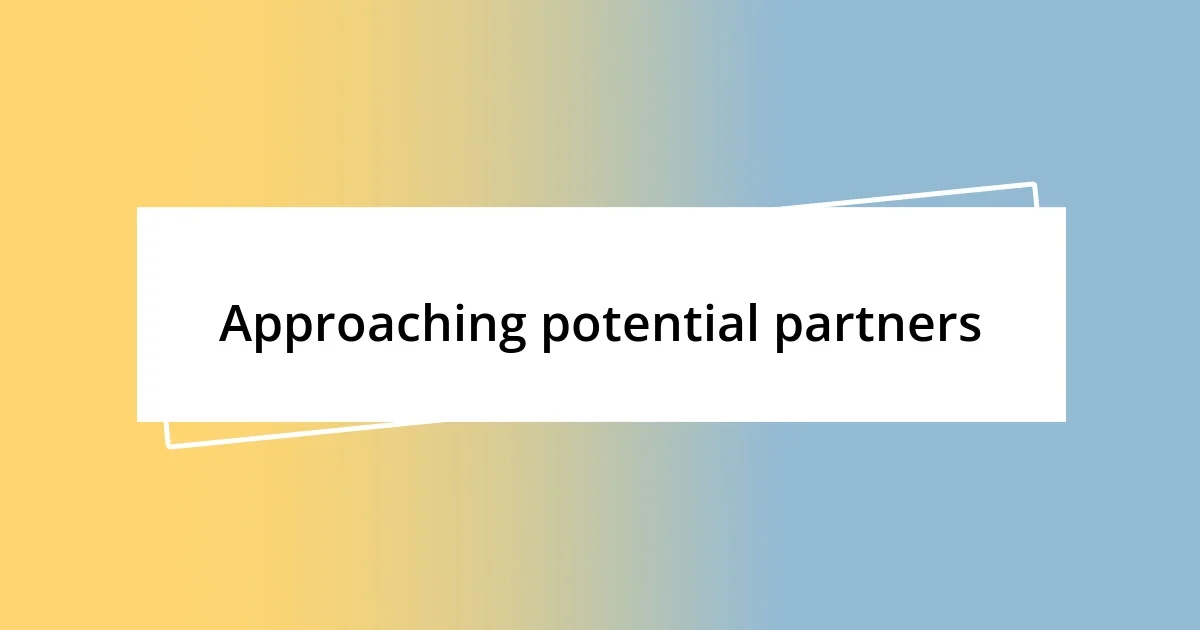
Approaching potential partners
When I first decided to reach out for an accountability partner, I felt a mix of excitement and nervousness. How do you even approach someone about this? I chose to be straightforward. I found it effective to share my own goals and the areas where I sought support. For example, I explained my desire to improve my fitness routine and how I thought we could motivate each other. That honesty opened the door for a more genuine conversation, and it made the other person feel comfortable sharing their own goals too.
One unexpected outcome was realizing how common these struggles are among friends and colleagues. After I broached the topic with a few people, I was amazed at how many others were also seeking a support system. It prompted some of us to form a small group, which added layers of encouragement and commitment. Have you noticed how people generally relate to the idea of accountability? I believe that mutual understanding creates a bond that enhances the partnership.
As I navigated these conversations, I learned the importance of being open to feedback and suggestions. At one point, a potential partner suggested that we start with a trial period, checking in for a month to see if it worked for us. This turned out to be a fantastic idea! What matters is finding a dynamic that feels right. Being adaptable can lead to a partnership that not only holds you accountable but also fosters growth and learning along the way.
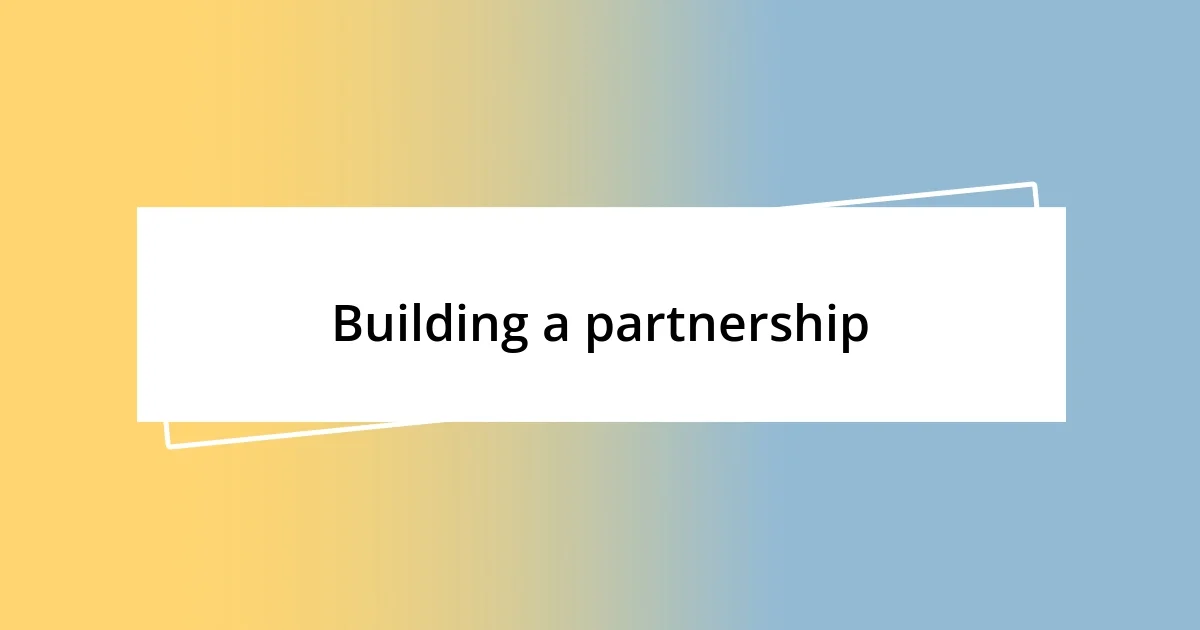
Building a partnership
Building a partnership is all about establishing a foundation of trust and support. I remember the first time I and my accountability partner set up our check-in schedule. We decided on weekly calls, and at first, I wasn’t sure how it would go. But the moment we got on that first call, discussing our wins and losses, I realized how essential this structure was for keeping me motivated. It felt like a commitment not just to my goals, but to our partnership as well.
Sometimes, I find that having a definitive framework can add a layer of comfort. For instance, we crafted a simple guideline for our conversations: start with accomplishments, tackle challenges, and set intentions for the week ahead. This pattern not only streamlined our discussions but also ensured that we celebrated each other’s successes, no matter how small. Don’t you think it’s vital to highlight progress? It’s like fueling the fire of motivation.
Reflecting on my journey, I’ve learned that flexibility is equally important. I once suggested a change in our meeting time due to my work schedule. To my surprise, my partner was completely understanding and even encouraged me to adjust it based on what worked best for both of us. That moment spoke volumes about the respect we had for each other’s realities, creating an atmosphere where both of us could thrive. Isn’t it amazing how small gestures can strengthen a partnership? When both individuals feel heard and valued, the entire relationship flourishes.
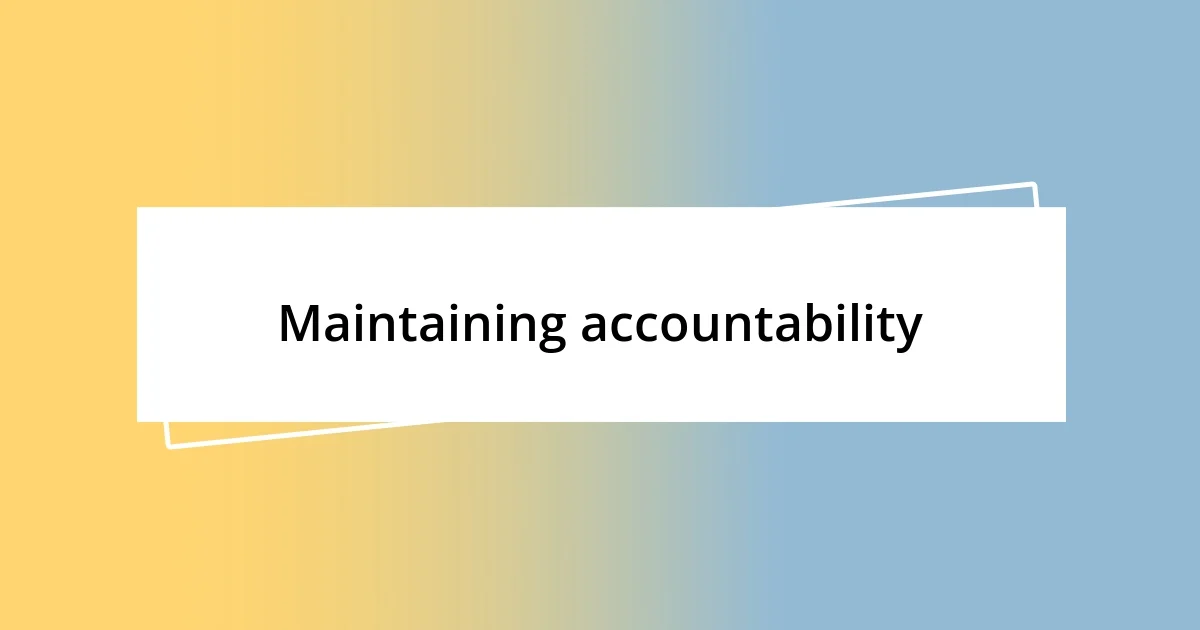
Maintaining accountability
Maintaining accountability is a continuous process that requires consistent effort and communication. I remember one week when I struggled to find motivation. My partner noticed my silence during our usual check-in and reached out with a simple “Are you okay?” That small gesture reminded me how vital it is to stay connected, especially when the going gets tough. Have you ever felt that little nudge from someone made all the difference? It’s that sense of caring that really holds us together.
One practice I swear by is setting small weekly goals. Early on, I made a commitment to read a chapter of a book each week. During our check-ins, sharing those small victories—like finishing that chapter—felt exhilarating! It built up my confidence and made the entire process enjoyable. I started looking forward to our discussions, as they became a way to celebrate progress instead of just looking at the bigger picture. Don’t you find that focusing on smaller milestones can transform your outlook?
I’ve also learned the importance of being vulnerable. There was a moment when I had to admit a setback related to my fitness goals. Instead of judgment, my partner offered understanding, sharing his own struggles. This exchange deepened our bond and made it clear that accountability isn’t just about achieving goals but also about supporting each other during the rough patches. Isn’t it liberating to speak our truths? This honesty fosters an environment where both partners can flourish, reinforcing the commitment to each other’s journeys.
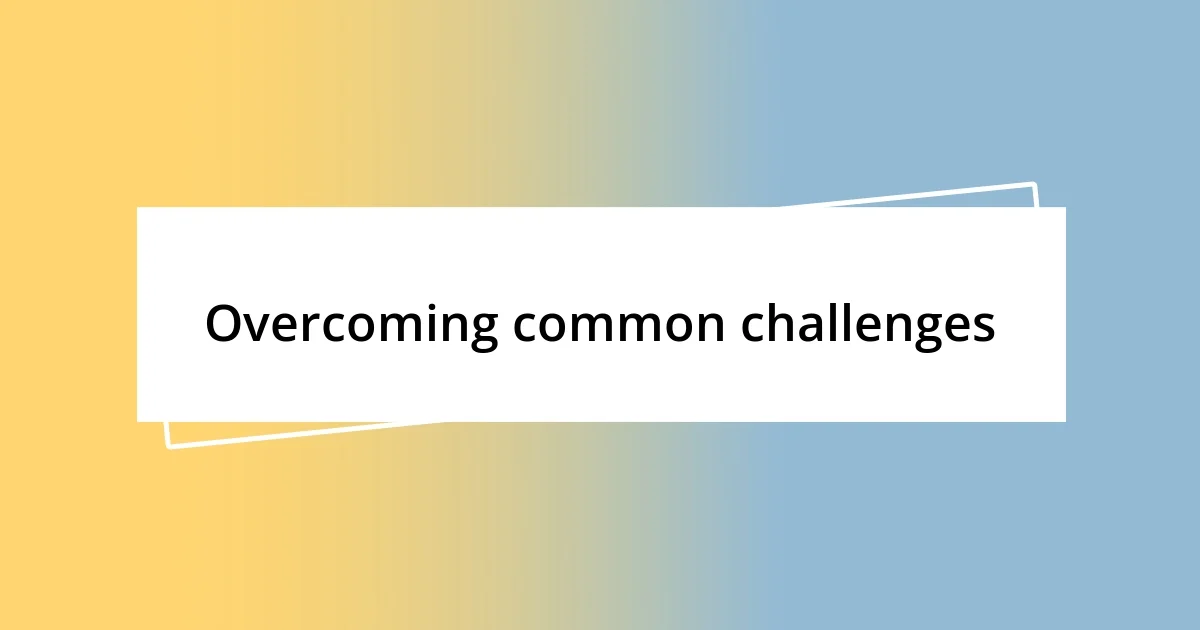
Overcoming common challenges
Finding an accountability partner can definitely bring about its fair share of challenges. I’ll never forget how I once found myself feeling awkward about sharing my progress. In my first few check-ins, I hesitated to discuss some of my less-than-stellar weeks. But then my partner, sensing my discomfort, shared a story of her own struggles. That moment of vulnerability shifted everything for me. Have you ever experienced a moment when someone else’s honesty made you feel braver? It reminded me that we all falter sometimes, and acknowledging that can actually strengthen our connection.
Another hurdle I faced was balancing differing schedules. During one particularly hectic month, coordinating times to meet felt like trying to solve a complicated puzzle. I approached my partner, half-expecting frustration, but instead, we brainstormed different ways to communicate, like texts or voice notes. It was such a relief and reinforced how collaboration shapes our journey. Isn’t it fascinating how those ‘aha’ moments can transform potential roadblocks into opportunities for creativity?
Motivation lapses are also a common challenge. There was a week when I felt completely depleted and nearly suggested canceling our check-in. However, pushing through that urge turned out to be a pivotal moment. My partner turned our session into an empowering discussion about self-care—not only did we talk about our goals, but we also explored ways to recharge. It was enlightening! Don’t you think recognizing when you’re running on empty is crucial? Balancing goal pursuit with self-kindness allows both partners to grow and thrive together, rather than burn out.












